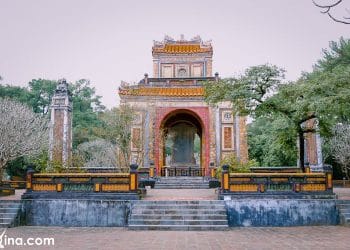Contents
Hue is renowned for many spiritual pagodas. Từ Đàm pagoda is one of the unique and ancient pagodas with the association of modern and old style. Besides, the historical pagoda has contributed significantly to the preservation and development of Buddhism in Vietnam.
Similar to other pagodas in Hue, Tu Dam pagoda bears the ancient beauty and contains spiritual values which are curious for any domestic and international tourists, culture lovers and Buddhists. Taking a walk around this pagoda, tourists have a chance to enjoy the tranquil and solemn atmosphere.
Location:
Located in the low hill and toward the southeastern in 01 Su Lieu Quan road, Truong An, Hue, Từ Đàm pagoda is about 2km far from Hue City along the western.
History:

As a famous ancient pagoda in Hue, Tu Dam pagoda became the important Buddhism centre of Vietnam. With the long-standing development history, Tu Dam pagoda went through many ups and downs. From the period of 1683-1693, the Buddhist priest Minh Hoằng Tử Dung, the Chinese person came to Hoàng Long hill, expanded the land, and named the pagoda Ấn Tôn Tự. Until 1841, its name was changed into Từ Đàm Tự pagoda.
In 1938, it was transmitted to An Nam Buddhology organization, and redesigned the whole structure. At the end of the 20th century, Thừa Thiên Buddhism group built the gate, meditation house, lounge, kitchen and lecture hall. Until 2006, the pagoda was in restoration and repair on the large scale to serve daily routines of monks and Buddhists.
Architecture:
Paying a visit to Tu Dam pagoda, tourists can admire the entire structure of the pagoda, which is typical for ancient Buddhism temples, but in the simple design and spacious area. This is the place to receive Buddhists, scholars, intellectuals and tourists nation-wide to visit. Besides learning about the pagoda, tourists will have a chance to contemplate the total architecture and beautiful landscapes in the pagoda.
Despite restored in many times, this place is still in integrity with the ancient architecture. The pagoda was built in the vast space and covered by many green trees. Regarding architecture, Tu Dam pagoda had three essential parts: the three-gate entrance, the main pagoda and a meeting house.
The three-gate entrance with the tile roof has three gates which is typical in traditional pagodas in Vietnam. Behind the gate, there is a Bodhi tree engrafted from the Bodhi tree where the Buddha reached the peak of Buddhism. That tree was given by Ms. Karpeies, the chairman of Buddhology organization and was planted in 1936.
Remarkably, the large yard was tiled with flat stone and spacious enough to gather thousands of people to take part in the ceremony. The primary pagoda includes the forecourt, the main palace and the house of cult. The forecourt was built on the granite base with the height of 1.5m; the roof was designed in “ancient house” style to make it look higher.
Tu Dam pagoda is alluring and looks distinctive because the designs on the edges and peak of the roof are couples of dragons symmetrically in the ranges of tiles. Under the roof, there are statues embossed about the biography of Buddha, pillars that have long meticulously sculptured parallel sentences, and two bell towers.
Inside the palace, it is solemnly decorated with the statue of Thích Ca Mâu Ni meditating in the lotus throne. Two embossed frames of Văn Thù and Phố Hiền bodhisattvas are placed in two sides. The layout is quite simple compared to other pagodas in Hue. The left side of the place was the lounge and room of Buddhist monks. In front of the lounge, there is a small flower garden. The bust of Tam Minh anchorite (who had a great contribution to the pagoda and Vietnam Buddhism rehabilitation and development) was located in the middle of the garden. Tu Dam pagoda was the reunion pagoda, so the club-house was constructed largely and spaciously with ten rooms and two floors.
Additionally, the pagoda is famous for Ấn Tôn tower where to worship seven Buddhists in the past that were casted by copper and built with the seven-storey octagonal shape in the left corner of the three-gate entrance, near Dien Bien Phu Street. Opposite to Ấn Tôn tower are the lecture hall and the office of Buddhist Sangha. The three-storey building has a basement, the middle floor is the office of Thua Thien Hue Buddhist Sangha, and the upper level is the lecture hall where to hold exhibitions, conferences and lectures.
Value:

Dam pagoda bears the spiritual and cultural values of Buddhism in general and Thua Thien Hue Buddhism in particular. It shows the meaning of Vietnamese belief in worshipping Buddha and ancestors. Besides, the pagoda was aimed at orienting humans to cores of peaceful life and moral values. Tourists will feel peaceful in mind when they come to the pagoda and immerse themselves in the calm landscapes, experience life here.
Other pagodas in Hue, Tu Dam pagoda represents the great architecture and layout of traditional Vietnamese style, you can easily see it nation-wide. This contributes to keeping the beautiful values of traditions and customs perfectly and transmitting to the next generations. It is also the aspiration of the ancestors to descendants who take responsibility for preserving these Buddhism values.
Nearby location:
Tourists can rent a motorbike or a car to come to Tu Dam Pagoda. Mainly, you can move conveniently to the city centre for taking a rest after visiting, because the pagoda is neighbouring to Dien Bien Phu street on the right and Phan Boi Chau on the left, you can drop by Linh Quan pagoda, Thien Minh Pagoda and even the temple worshipping Phan Boi Chau.
Tu Dam has had a close relationship with Hue people’s spiritual life and national Buddhists. Let’s take a trip to Hue if you want to visit and oversee this famous pagoda!















